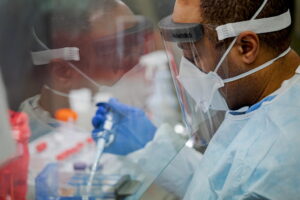Tag: grants
Making a Worthwhile Investment: PC Provides Grants for COVID-19 Research
by The Cowl Editor on February 25, 2021
Campus

Photo courtesy of Flickr.com.
by Sydney Olinger ’23 and Kyle Burgess ’21
News Staff
Nearly a year after the first string of international lockdowns due to the COVID-19 pandemic, the race to find the most effective and obtainable vaccine for the novel coronavirus continues to heat up. Major pharmaceutical giants such as Pfizer, AstraZeneca, and Moderna have each developed their own respective vaccines and have seen their wares distributed across the United States and Europe. Although the finish line for herd immunity appears to be in sight, much work remains in helping to understand the medical, economic, and social consequences of this historic moment.
Here at Providence College, five faculty members have taken it upon themselves to assist in answering these questions with their own research projects. Each of them has received short-term research grants from the College’s Office of Sponsored Projects and Research Compliance totaling $10,000 in funding with support from the Rhode Island IDeA Network of Biomedical Research Excellence.
Dr. Kris Monahan, director of SPaRC, explained how PC wanted to provide an opportunity for both faculty and students to make the most out of the current situation in conducting research.
“A strategic decision was made in consultation with the SPaRC advisory committee that the best way to support faculty scholarly work this year was to provide direct support to faculty who wanted to work with students to explore, understand, and develop solutions related to the COVID-19 pandemic,” said Monahan. “While we don’t expect to be positioned to always make direct grants, we are pleased that we were able to fund these pilot projects.”
Some of their findings have already begun making headlines in the battle to contain the virus’s spread. Father Nicanor Austriaco, O.P., of the biology department, for example, has been spending his sabbatical leave at the University of Santo Tomas in the Philippines developing a yeast-based COVID-19 vaccine. He was inspired by the plight of many Filipinos who were unable to obtain Western vaccines due to their socioeconomic status. Unlike the vaccines produced by many leading pharmaceutical companies, Fr. Austriaco’s vaccine would not need to be stored at lower temperatures and could be dispersed at little to no cost for potential recipients. “The poor are [the] beloved of the Lord,” he explained. “We should make COVID-19 vaccines available to them at no cost. This is both the ethical thing to do, because we should provide for those in need, and the scientific thing to do, because the poor often live in densely populated areas that tend to harbor the virus.”
Meanwhile, Dr. Fang Dong, associate professor of economics, is hoping to comprehend the economic fallout from the pandemic. More specifically, she aims to discover the interrelatedness between unemployment rates, COVID-19 cases, and stringency/movement restrictions indexes. With the College’s financial backing, Dong has been able to hire two research assistants from the economics department to collect data across the globe on variables such as gross domestic product and unemployment in 2020. “There are so many colleagues who had already been or are also working either solely or collaboratively on COVID-related research projects and I am just lucky to receive the grant,” she explained.
For some communities, the consequences of the COVID-19 pandemic have only compounded previous natural and economic disasters. Dr. Jessica Mulligan of the health policy and management department, along with the help of five student researchers, is looking at the experiences of healthcare workers in Puerto Rico as the island continues to reel from the effects of Hurricane Maria, which hit in 2017. The team aims to identify the ethics of care styles circulating among healthcare workers during COVID-19, develop dialogues with healthcare workers working after what they call “compounding disasters,” and establish policy recommendations to improve working conditions within the U.S. territory.
Elementary and special education professors Dr. Marci Zipke and Dr. Lori Dunn are using the College’s generous financial grant to investigate how pre-service teachers can best prepare themselves and their students for learning during the pandemic. “We have administered a survey to the undergraduate pre-service teachers who took methods courses last semester in order to explore best practices,” said Zipke. “We suspect that a combination of synchronous meetings and asynchronous assignments, with flexibility and judicious use of technological tools is most effective for course work, and that virtual field experiences have clear benefits in terms of the students’ perception of their preparedness for teaching, but we are still analyzing the data and holding focus groups.” Both Zipke and Dunn believe that their research will help teachers learn which course designs, technological tools, and field component formats will work best in the virtual classroom as social-distancing measures continue to keep schools closed.
With the help of these grants, the Friar Family is beginning to unravel some of the complex and multifaceted consequences caused by the COVID-19 pandemic.
